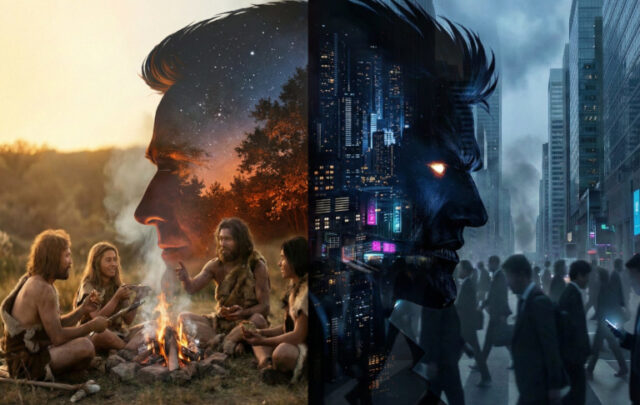My first book, “Energy & Finance” is being published at the end of February and I am now researching a second one. This is the draft introduction to the book I am thinking of writing about society’s inability to act on the systemic threats that it faces. Proposed improvements and comments would be much appreciated.
Lost in a make believe world while we destroy the real one.
Human civilization stands at a crossroads, either it continues its current path of “business as usual” and faces escalating crises on its journey to destruction, or it fundamentally reassesses its relationship with its environment and accepts limits upon how much it can safely take from the earth each year. The underlying crisis that it faces is not climate change, peak cheap energy, or ecological destruction, as these are just symptoms of the underlying problem. All of these challenges stem from the continued exponential growth in human numbers and the demands that each of those humans, especially in the industrialized countries, make of the earth and its ecology. It is estimated that humanity currently takes from the earth at a rate that is 50% faster than the earth can replenish(1), and will require two earths worth within about two decades(2).
The only way that human industrialized societies have been able to continue with such destructive and suicidal ways is through the development of a delusional belief system, hallucinations that render reality invisible behind the cloak of an imaginary world, and deeply flawed illogic which passes for deep insight. As our societies hurtle towards extinction their citizens can remain blissfully wound up in their delusional beliefs, hallucinations and illogic. Confronted with an individual showing such symptoms a psychologist would quickly identify the outward manifestations of a major mental illness, schizophrenia. The larger and more complex our societies have become the greater the harm they do to our only home, the earth, the more we must descend into schizophrenia to escape the realities of our destructive behaviours. Unless the elites, who are both the guardians and the major beneficiaries of the status quo, are forced into a discomforting reengagement with reality, a new dark age will be our destiny. The only question will then be how long the incredibly complex and destructive societies that we have constructed for ourselves can be held together. These societies can only function through the plunder of the earth’s ecosystems, its mineral resources, and the fossil fuels which represent many millions of years of ancient sunlight.
This is not just an issue with capitalism, the removal of which will not change the path to destruction. The belief that the earth’s only function is for the benefit of the human race, and that through its cleverness humanity can overcome any of earth’s limitations, goes back many thousands of years. The genesis of such mistaken beliefs occurred with the extensive use of agriculture and animal husbandry, which both set humans apart from nature and allowed humanity some level of control over the natural world. Anthropologists have noted that the surviving hunter gathering communities tend to see themselves as part of nature, while agricultural and animal husbandry societies see themselves more as civilized entities set apart from the wild nature upon which they have gained some control(3,4). The masses of poor within such societies did not benefit from the utilization of agricultural practices, as attested to by skeletal remains which show a significantly lower level of health and stature when compared to hunter gatherers who consumed a much more varied and healthy diet. Any food surplus was quickly used up by growing populations and the demands of the elites that sprang up to expand their wealth and power through the control of those surpluses. The sheer weight of numbers, together with the ability to feed an army, made such societies irresistible in their continual search for more land to feed the increasing numbers and elite demands. The surrounding hunter gatherers either moved away or were defeated, with the unsustainable groups expanding at the expense of the sustainable. Over time many complex societies grew, and many collapsed, but overall the agriculturalists continued their growth at the expense of the hunter gatherers, who to this day are seen overwhelmingly as “savages” that need to be integrated or eradicated in the name of religion or progress. The religions of the complex societies came to reflect a human-centric view that both gave humanity dominion over the earth, and provided the rationale for the destruction of those “heretics” that would not accept the official “true” religion.
The elites of these societies understood that more than just brute force could be used to control the masses that toiled to provide their wealth and power, and thus both bureaucracy and religion were brought to bear as efficient controls. Of course, where these failed there were still horrific punishments to deter challenges. There were repeated challenges from the masses, but the greatest threats to the rulers of such societies tended to come from within their own elite, from the elites of other competing societies, climatic changes, and the slow degradation of the soils inherent to agriculture. From the fifteenth century onwards the European nations solved the latter problem through the taking of vast new lands in the Americas, and Oceania, that provided nitrogen (for replenishing the exhausted European soils) and food, together with an outlet for surplus populations. These lands were depopulated primarily through European diseases with the human remnants dealt with through a subjugation and slaughter which has continued to the present day. A new lebensraum was created, cleared of its previous inhabitants. The subjugation of Africa and the Far East was slower given the inhospitableness of the climate and local infections to Europeans in the former, together with the resistance of established advanced civilizations in the latter. The overcoming of ecological limits through the taking of lands from others was reinforced as a successful strategy and shown to be the only way to survive as a society in the long run. Either take or be taken. The acceptance of ecological limits would simply lead to a level of weakness that would attract others seeking to evade such limits through conquest.
 Still, even at this point in history humanity lived well within what the earth could provide. The cycle of societal growth and collapse would have continued over many thousands of years until possibly the next ice age came along as an insuperable challenge. Complex human civilizations owe their existence to the luck of being within the “long summer”(5) of the Holocene inter-glacial period when the ice sheets retreated towards the poles, opening the huge land expanses of the Northern Hemisphere.
Still, even at this point in history humanity lived well within what the earth could provide. The cycle of societal growth and collapse would have continued over many thousands of years until possibly the next ice age came along as an insuperable challenge. Complex human civilizations owe their existence to the luck of being within the “long summer”(5) of the Holocene inter-glacial period when the ice sheets retreated towards the poles, opening the huge land expanses of the Northern Hemisphere.
The successful utilization of fossil fuels, first coal and then oil and natural gas, provided both cheap and phenomenally large amounts of energy that allowed human civilization to leap over the limits set by agriculture. Our beliefs give applied human ingenuity, technology, as the reason for the fantastic advances of the past two centuries. This technology though has been used to utilize the phenomenal and concentrated energy provided by the fossil fuels, without such the steam engine would not have been much use, and without a liquid energy source the internal combustion engine would have remained simply an idea in the same way that the sketches of flying machines and submarines by da Vinci have. The miracles produced with the fossil fuels, which we now take as given, allowed the belief in humanity’s ability to always overcome natural limitations to grow and become an accepted truism.
The increasing size and complexity of society, which accelerated with the use of fossil fuels, separated the individual from direct involvement in important events and replaced first hand experience with mediated recollections and interpretations of those experiences. Firstly through the pronouncements of church and state, then through the written word and mass industrialized schooling, and then radio, films and television. As agriculture has become mechanized, concentrating the population of the rich and developing countries into urban centres, even the first hand experience of the natural world has been removed. Trips to see “nature” are predominantly to the artificially created national parks and other eco-tourist destinations. The reality of living within nature on a daily basis has been completely lost. Instead, the average citizen exists within a totally human-constructed environment, completely dependent upon others to construct representations of reality outside their small artificial world. These constructed hallucinations have become a new means of control, where the very conceptual structure upon which decisions are made can be controlled through the manipulation of the steady stream of hallucinations that the media and other institutions provide. Both through the selection of events that are deemed coverable, and the interpretation of the larger meanings of those events, reality can be constructed and manipulated.
This “matrix” may not be as physically invasive as its movie counterpart but is still extremely effective in moulding the thought processes and beliefs of individuals in modern societies. Weapons of mass destruction are created from nowhere, the eradication of countless species is made invisible, and exploitative elites are celebrated. Given that these messages are predominantly controlled by those elites, who are both the most indoctrinated in the ruling beliefs and benefit from them the most, they will tend to reflect and reinforce the validity of such things as exponential growth and the limitless possibilities of human ingenuity. The group hallucinations provided by the media and other institutions of socialization will then reflect this invented reality, obscuring and hiding the actual reality of our ecological destructiveness.
With the overwhelmingly private media outlets reliant upon advertising revenue for their continued existence, upsetting and challenging content will tend to be either not shown, watered down, or juxtaposed with positive messages. The continuation of the consumer society is central to economic growth and people who connect their consumption habits to the destruction or diminution of the environment upon which they and their offspring are dependent upon may not exactly be the best consumers. Thus, the short-term imperatives of organizational success can overwhelm the longer run considerations of societal survival. This situation has been exacerbated by the concentration of the media, together with the ownership of media organizations by industries tied to continued economic growth and fossil fuel usage. The internet promised access to many new media sources, but in reality has become just as colonized by concentrated private entities which push hallucinations of happiness through consumption, never ending growth and human genius overwhelming all obstacles.
The flawed and twisted logic propagated through fundamentalist religion still holds sway in many parts of the world, even in some of the most developed countries. To some of these true believers only God can affect large-scale changes and thus to even state that climate change is created by humans can be treated as heresy, and the destruction of the earth’s ecology is not important as God will rescue the true believers by beaming them up to heaven in The Rapture. For the rest of society human technology, endless progress, and economics are the new religions. In the latter, the economy can exist separately from society and even the earth, which is treated as an externality, with the “invisible hand” of the market the new God. Only through its unfettered actions can true happiness and prosperity be achieved, and our miraculous science and technology can replace “natural capital” with human created capital. Any limits can be overcome as humanity will always find a way to substitute for depleted resources and destroyed ecosystems. As with the previous religions, many proponents are true believers but others at least understand that substantial flaws exist but value the status and financial position that the outward display of true belief provides. Such individuals will understand more than even the true believers the importance not to confuse the masses with inconvenient facts and logic which may reduce belief in the new religions which provide them with their wealth and status. As with the previous religions the new ones provide a complex conceptual cover for the true reality, healthily funded by the elites that both benefit most from the status quo and are the most brain-washed with it.
For individuals to remove themselves from the current “accepted truths” and discover the reality of the situation will be very difficult, and somewhat uncomfortable as such a move will challenge the beliefs of family, friends, colleagues etc. This book provides an alternative story, based more on actual reality than our society’s current stories, to be used both for self-education and as a resource to counter others who are still invested in the dominant beliefs.
References
n/a (2013), Earth Overshoot Day, Global Footprint Network. Accessed at http://www.footprintnetwork.org/en/index.php/GFN/page/earth_overshoot_day/
n/a (2012), More than two planets needed by 2030, World Wildlife Fund. Accessed at http://www.wwf.org.za/what_we_do/ehcc/?uNewsID=5960
Bulliett, Richard (2005), Hunters, Herders and Hamburgers, Columbia University Press
Harper, Kyle (2013), From Shame to Sin: The Christian Transformation of Sexual Morality in Late Antiquity, Harvard University Press
Fagan, Brian (2004), The Long Summer: How Climate Changed Civilization, Basic Books























